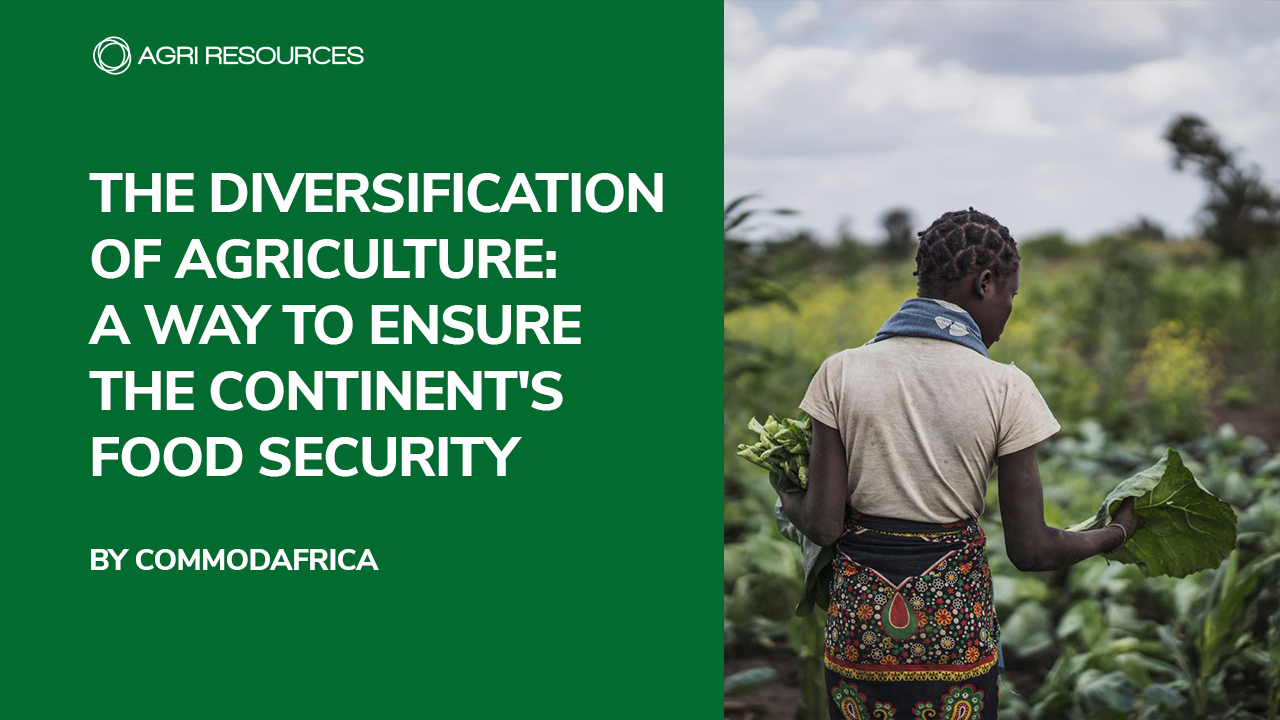Link to the original article (Fr): http://www.commodafrica.com/29-03-2022-la-diversification-de-lagriculture-un-moyen-pour-assurer-la-securite-alimentaire-du

The Russian-Ukrainian conflict, the Covid-19 pandemic, the supply difficulties, and tensions in the global supply chain, as well as the increasing inflationary pressure, bring no shortage of concerns for economic players on the African continent. On the agricultural level, to address the looming food insecurity of the population, it is becoming urgent to proceed with agricultural diversification.
Local production and processing, are a necessity for the continent
According to the Africa Center for Strategic Studies, more than 100 million Africans faced a crisis, emergency, or catastrophic levels of food insecurity in 2020. In this unprecedented health and socio-political context, issues of agricultural production and transformation in Africa are more than ever at the heart of public policy issues. Many countries and companies are committing to greater resilience of agricultural and food systems in order to be able to cope with crises and blockages in international supply chains. While the dynamic is not new, the Covid-19 crisis has helped to accelerate this process. Thus, in 2021, many African states, such as Benin, have announced their commitment to major investment projects aimed at developing more local, sustainable, and locally processed agriculture.
In fact, the Beninese government has set increasing the production of food commodities for local consumption as a priority. Leading producer and exporter of cotton in West Africa with a production of 728,000 tons in 2021, Benin, in partnership with Agri Resources Group, the agricultural branch of Monaco Resources Group is set to invest 8.5 billion FCFA for the production and rice, fruit and vegetable processing.
Despite all these commitments, players in the sector remain highly dependent on exogenous market fluctuations. To limit the risks, these already commendable initiatives must be reinforced at the level of States and industrialists in order to guarantee the sustainability of agricultural production, both from a socio-economic point of view for local producers and from an environmental aspect.
Supporting local producers is a necessity
The question of income and the cost to the producer is at the heart of the challenges of resilience. Since a large part of the continent’s crops is intended for export, this issue directly echoes that of the local processing of raw products and the creation of added value in the country. In addition, increased yields must go hand in hand with more sustainable and environmentally friendly production methods. For this, the establishment of technical support and financial support from local communities is essential.
This win-win partnership between large companies and local farmers is illustrated for example in Ghana. Established in the Bono East region in 2020, Prang Agro Resources, a subsidiary of Agri Resources Group, has invested in diversified agricultural production. From vegetables, such as onions and peppers, to cereals such as rice, corn and sorghum, and soybeans, the company prepares a portfolio of agricultural products that are in high demand on the local market.
“To meet the challenges of sustainability, the company has notably set up an assistance program for local farmers by offering to buy back part of their production in order to give them access to a larger market. This approach, which complements the development of certification programs such as Fair Trade or Fair For Life, puts small producers at the centre, by guaranteeing them sufficient and viable incomes. These initiatives allow them to project themselves into the future and deal with unforeseen events such as the fall in the price of certain raw materials” explains Alban Bonnet-Casson, Chief Sustainable Officer of Agri Resources Group.
Nevertheless, faced with the fluctuation in the price of raw materials, monoculture appears to be extremely fragile – the diversification of production is therefore one of the solutions. Likewise, growing local products that were previously untapped is a good way to showcase cultivated areas and involve local communities.
Combining different crops also makes it possible to take advantage of symbiotic associations by improving yields and productivity. Agroforestry is thus a mode of production destined to develop. Combining trees, crops and/or livestock, agroforestry makes it possible to improve and diversify the production of plots by optimizing environmental resources and restoring soil fertility. Trees are also excellent carbon sinks for combating climate change.
To meet the challenges of resilience, a new agricultural dynamic is emerging in Africa. More local and more sustainable, the new face of African agriculture aims to ensure the continent’s food security while guaranteeing the competitiveness of exported products on the world market. New synergies must therefore be developed. By supporting local producers, agro-industrial players have more than ever an essential role to play.
